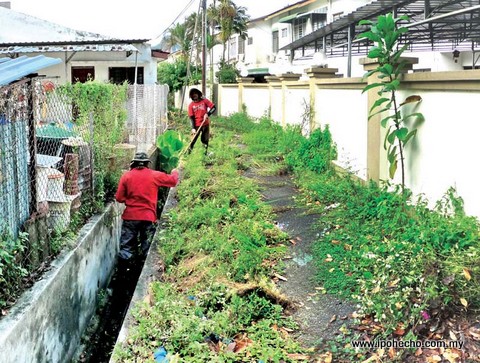

By Joachim Ng
Top-class property developers are doing a better job managing your needs than the politicians and their appointees. It’s evident in Perak and every other state. After completing a development and getting 5,000 people to move in, the developer sees to it that you live in surroundings with cleared drains, cut grass, unlittered walkways, well-maintained roads, and a fresh green look.
But if you live in an equally-sized housing estate managed by the local council, what do you always get? Clogged drains that overflow during rain. A Taman Cherry resident complained last month that she hardly saw any workers cleaning the drains, and only when dengue was reported did the Ipoh City Council and Health Department officers rush to the area.
Councillors hold the mistaken view that drain water doesn’t breed Aedes mosquitoes. Wrong. They have obviously never stepped inside a drain for inspection. Drain water may look dirty to a councillor but it is clean enough for a mosquito to lay eggs. Clogged drains also cause floods, but the worst flooding cases resulting from blocked drains occur in Kuala Lumpur where affected residents may complain for months with no effect.
Illegal dumpsites are of course a perennial problem in Ipoh. Favourite dumping spots are the legs of signboards, pointing to the canine behaviour of scoundrels. By the time the rubbish is cleared, tourists would have taken pictures and uploaded them for a laugh.
Who cuts the undergrowth that hides legions of mosquitoes? Nobody. As a result, Kampung Simee became a dengue hotspot some months ago. The council says it is blameless as it is the responsibility of contractors who are paid to do the job. The contractors also claim they are blameless as they outsource the work to subcontractors who may have outsourced it further down the line.
Next time you drive along the trunk roads north to Penang and south to Selangor, keep an eye on the ground and you will see plastic discards of all sorts, rubber tyres, diapers, carton boxes, and rotting furniture. You’re in no man’s land that extends to the country roads of Selangor and the suburbs of Kuala Lumpur.
Have you been to fancy global enclave Mont’ Kiara? The walkway up a luxury hill now resembles garbage street with unpicked discards all along the pavement, and of course, face masks.
Local government is failing miserably, and you can’t fix the problem by holding elections for mayor as some have clamoured for. Elections can only worsen the situation by racialising all the neighbourhoods and sending political parties to your fence to talk their usual rubbish. As if there isn’t enough garbage.
Why are property developers successful in governing the neighbourhoods that they develop? The secret lies in the phrase: on-site. Managers live and work in the neighbourhood. Does any city councillor or city official live and work in your neighbourhood? No.
City councillors and officials work in faraway land and they don’t know anything about your drains, your rubbish, your uncut grass, your potholed roads and your myriad other problems. They can’t supervise the contractors because it’s an hour or two before they can reach the site. And they have to fill up a transport form.
This model of governance that Malaysia is glued to is a proven failure. Several countries already know that you can’t micromanage a drain from 10km away, and they are switching to a tried model of localism called neighbourhood governance.
China has divided its population into more than 100,000 neighbourhoods of 10,000-13,000 people each on average. Every neighbourhood has a committee with a number of full-time staff. Needless to say, all committee members and staff live in the neighbourhood.
Some European municipalities have also pushed for community empowerment, allowing neighbourhood committees to engage and supervise contractors, with funds allocated to them. The city council’s role is to set performance benchmarks and monitor the results quarterly. Of course, the gold medal winner is Japan where every citizen feels he is the chairman of his neighbourhood and will pick up that throwaway on the pavement.
In public hygiene, Malaysia has already lost to Rwanda. Unless the Prime Minister empowers homeowners to govern their own neighbourhoods with authority to issue summonses on offenders, the standard of cleanliness in Malaysia will deteriorate and may fall below the median line. A series of medical studies have shown that unclean neighbourhoods suffer more diseases such as diarrhoea and respiratory ailments as well as neurological conditions such as depression. Action must be taken before it is too late.


